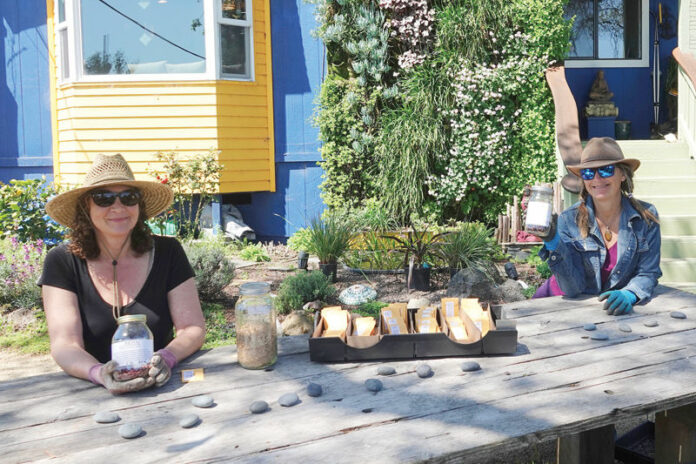The Sebastopol Seed Bank, which lives at St. Stephens Episcopal Church on Robinson Road, has always been a quixotic venture.
It emerged from Transition US, an environmental movement which urges people to prepare for the moment when the infrastructure of civilization crumbles and towns, like Sebastopol and its residents, are left to fend for themselves.
In some parts of the country, a worldview like this would involve the hoarding of guns and ammunition. In Sebastopol, it involves the collecting and careful storage of seeds.
Enter the coronavirus pandemic, which if it hasn’t knocked down the pillars of civilization, has certainly given them a good shake. In response, west county is having a Prepper-lite moment, with would-be food gardeners flocking to Harmony Farm Supply in Graton and other gardening stores, buying food crops for home gardens.
Concern about the food supply ratcheted up when some home gardeners had trouble ordering seeds from national seed companies that were overwhelmed by the sudden demand.
Into the breach stepped the Sebastopol Seed Bank, which in the last few weeks, has given away over 1,800 seed packets to local would-be food gardeners.
“When shelter in place happened, we were like, ‘Well, how do we support all these gardeners that are getting so excited?’” said Sara McCamant. “We knew that people were getting really into gardening. All the nurseries and garden places are getting swamped. We started hearing reports that seed companies were getting swamped, and they weren’t able to fill all their orders.”
McCamant said members of the seed library decided to offer 18 varieties of seeds from the library’s collection.
“We made a little online order form, and just put it out to our mailing list and on Facebook. Within three days, we had over 100 orders and most of them got like 10 packets,” McCamant said.
And the orders kept coming.
“Two Seed Bank Members, Laurel Anderson and Kerry Lee Cole packed the seeds up and put them in bags. We had a drop spot at the church, so people could just come by and get them when they needed it,” McCamant said, noting that “We do all of our work for free. Everything’s free.”
It was a gratifying moment for McCamant.
“The reason why we started the Community Seed Exchange was out of the Transition Movement and the idea of ‘How do we create a more resilient community?’ and ‘How do we create a more resilient food system?’ We were always saying as long as we have all of our seeds coming from other places in the world, we’re always going to be vulnerable. And this was a moment where we felt that like, ‘Oh, all these people are wanting to garden, and you can run out of supplies, especially when supply lines are impacted all around the world. So it felt like it was a really exciting moment to show the resilience of having local seed available for local people.”
McCamant said the seed library gave away seeds for Costada Romanesco zucchini, lettuce, kale, broccoli, green beans, butternut squash, red and gold beets and black popcorn.
“It’s all being grown locally. It’s locally adapted and the whole idea is to support people growing food,” she said. “There are seed libraries all over the country, but we’re one of the only ones that’s 100% locally grown.”
McCamant emphasized that all of the seeds at the Sebastopol Seed Bank were raised without pesticides and the seed was saved and prepared by hand—which can be an elaborate and time-consuming process.
“We grew the zucchini, and we did this whole, long, hand-pollination process, where we go at night and we pin the flowers closed so no bees can get in them. And then the next morning we go in and hand pollinate the male and the female flowers so that they breed true and they’re not getting crossed with other zucchinis in the neighborhood. And so, yeah, it was a pretty big labor of love. In the end, we got a lot of zucchini and now we have enough zucchini seeds to really supply all of Sonoma County with one of the best tasting zucchinis in the world.”
McCamant hopes the success of this month’s seed giveaway will encourage more people to get involved.
“We’re always looking for people to support our work here and to volunteer,” she said.
People can reach the Sebastopol Community Seed Exchange, which runs the seed library, at communityseedexchange.org.
61.6
F
Healdsburg
April 19, 2025








